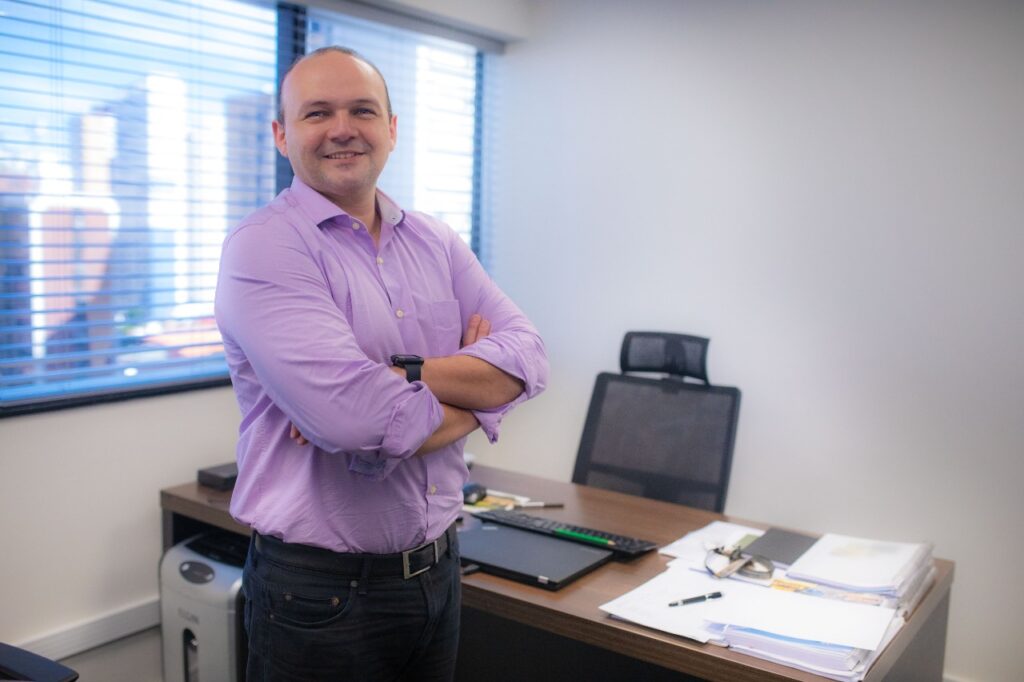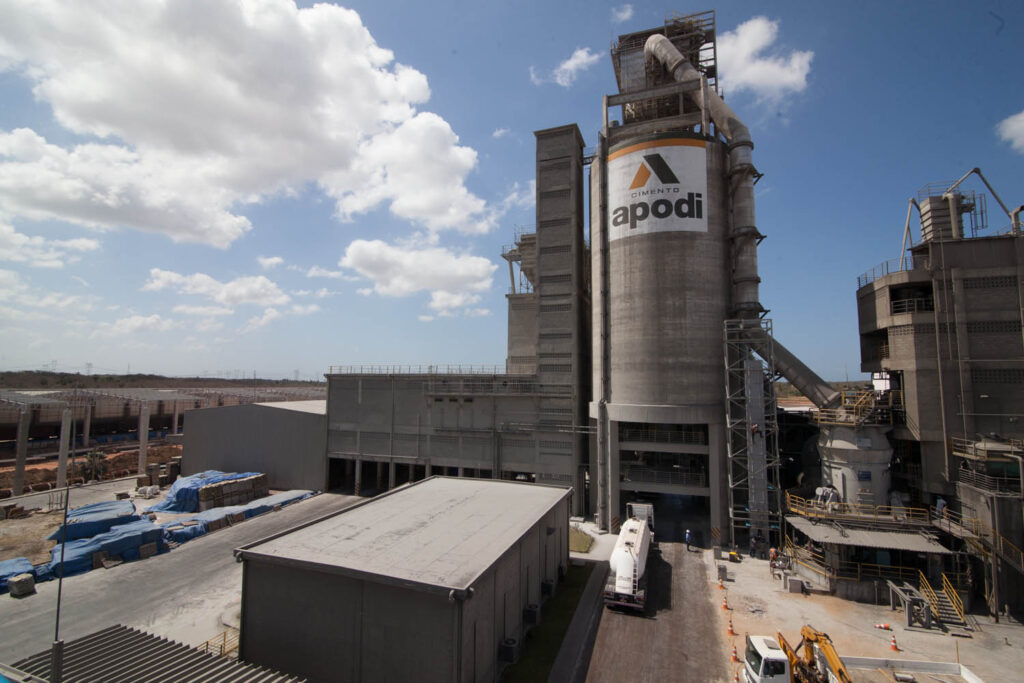Interviews
Eduardo Amaral (Apodi): Sustainable Solutions
19:36 14 de November de 2022 Por Daniel Oiticica

Eduardo Amaral, Administrative and Financial Director of Cimento Apodi and President of the Pecém Industrial and Port Complex Companies Association. (AECIPP)
Cimento Apodi has a history of more than a decade of operations in the Industrial and Port Complex of Pecém (CIPP). During this period, the company has expanded its market vision in the supply chain business among the enterprises installed in the CIPP. In this business universe, the Pecém Industrial and Port Complex Companies Association (AECIPP) has participated as a collaborative institution, focusing on the sustainable development of the CIPP. Eduardo Amaral is Administrative and Financial Director of Cimento Apodi and President of AECIPP. In this interview, he tells us a little about the performance of these institutions in the growing market, as well as drafting steps for the future.
How did Cimento Apodi’s history begin in the Port of Pecém Industrial Complex?
We started our operation in 2011 with a shipment of cement and concrete within the CIPP. From then to the present day, we supply cement for the construction projects of the plants installed within the complex, such as the construction project of Companhia Siderúrgica do Pecém (CSP). In 2013 and 2014, respectively, we expanded our strategic vision of the business and opened two Distribution Centers (DC). One of them is in São Luís, capital of Maranhão, and the other in Teresina, in Piauí. Since then, we started to use the rail logistics modal, by means of the Transnordestina railroad, which passes next to our industrial unit (milling). In this way, we were able to sell our product to the respective states. With a focus on expanding our operations in the market beyond the Northeast region, in 2015 we opened new DCs in other states, among which Pará can be mentioned. Since then, we have started to ship cement via cabotage to the North region of the country. The CIPP has a very rich strategic potential in promoting business. We at Cimento Apodi, in addition to enjoying the logistical advantages, as the complex is strategically positioned, we also do a lot of business in the supply chain with the companies installed in the CIPP. These activities give us low transport costs, because of the proximity between the companies, as well as the use of productive capacities with mutual benefits for the companies. An example of this is the contracts for fly ash and blast furnace slag, respectively, with the thermoelectric plants EDP and ENEVA, in addition to CSP. With this partnership, we add the waste generated by these companies to our production process and use it as inputs in our industrial units. This is a good example of synergy and circular economy that correlates with our market positioning, which is focused on sustainability. The advantages of being in the CIPP go further. They extend to our main plant located in the city of Quixeré, as we import one of our main inputs through the CIPP Port, using the infrastructure and services of partner companies, in addition to our plant sheds in the complex to provide logistical optimization.
What are the main factors that led the company to grow in the Ceará market in recent years?
The main factors are the favorable economic environment in the long-term view, the competitive intelligence of Cimento Apodi and its investors in the market, in addition to our focus on incorporating technological changes, good human resources management and stimulating sustainable growth.
What are the advantages of being strategically located in the Port of Pecém Industrial Complex, a port integrated with the production chain?
They are countless, but I will mention the competitiveness in logistics costs, the favorable ecosystem and the combination of business and intelligence.
Considering your area of operation in the company, which segments present the greatest possibility of investment, to strengthen your production chain and make it even more competitive?
In the coming years, we have investments planned for our two cement plants in Ceará. It is an area with a lot of potential, so the investments will be in the order of 200 million Reals (about 37.7 million dollars). At this stage, the focus will be on clean energy, the replacement of fossil fuels, as well as the use of reprocessing technologies for greater efficiency and to increase production capacities.

Thinking about the future, what are the main projects Cimento Apodi is planning?
We are looking at the opportunities for investments in clean energy, fossil fuel substitution, and reprocessing technologies. Our vision is in line with the world trend in the search for sustainable solutions to increase competitiveness. Ceará, in this aspect, occupies a vanguard position, as it encourages the green hydrogen chain as an energy solution.
You are also President of the Pecém Industrial and Port Complex Companies Association. How does the institution work and what are its main objectives.
The Pecém Industrial and Port Complex Companies Association (AECIPP) is a collaborative institution focused on the sustainable development of CIPP. Its strategic planning is based on three axes of action. They are Governance and Management, Industrial Infrastructure and, finally, Social Infrastructure. As fundamental agents of this development, we have the associated companies and their supply chain, as well as governments and their administrations, in addition to the academic class and the local communities. Our projects include training to qualify the region’s workforce, qualification of the local population, referral to the job market, providing services to communities, developing joint strategies for safety at work and property safety, as well as encouraging business. In 2021, we referred 20,000 people to the job market, which resulted in 5,500 jobs. CIPP currently has around 79,000 workers.
Could you detail the Synergy project that was launched in June 2022?
The Sinergy Project was created to promote business between its members, as well as promoting the business of the chain already installed in the CIPP. This activity stimulates the job and income generation, more efficiency for the capital employed, the local collection of taxes, in addition to reducing storage and logistics needs, since the production is in the neighboring company. This is direct and objective sustainability. The premise for this to happen is to bring people together and our project was designed with that in mind.
In light of these advances, what are the biggest challenges?
Considering that we have large investment projects for the coming years, such as the promotion of the State of Ceará in the Green Hydrogen chain for the region, this means that we can have double applications in the CIPP in the coming years. So, our main challenge becomes sustainable growth, as the speed of progress brings factors that need to be strategically monitored. For this, a qualified workforce is needed to avoid direct competition between companies. We also need to break the supply chain, demand for products and services without supply. We, who make up the AECIPP and installed companies, are positioning ourselves with this view, which is still a challenge.
What would you say to investors who are interested in investing in Ceará?
Investors need to keep in mind that the focus should be on the State and not on governments. That is, they need to think, focusing on long-term results. The attraction to co-opt these investors are issues related to the fulfillment of contracts, tax benefits, logistical advantages, already installed infrastructure, as well as the high potential for wind and solar energy production.
How do you see the Complex in 10 years?
A well-developed region with a consolidated industry. We see ourselves as a leader in the production of green energy, as the main factor in economic, social and technological development.
